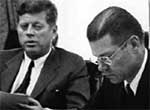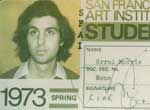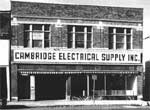Where's the Rest of Him?
This is a slightly modified version of the editorial published in The New York Times, January 18, 2005.
So why is George W. Bush taking the oath of office this week and not John Kerry? For me, the answer is clear: Mr. Kerry failed because of his inability to tell his own story. John Kerry could have presented to the American people his full biography, but instead he chose to edit who he was. Why?
 My guess is that Mr. Kerry and his campaign believed that
certain things could not be mentioned. Foremost among these
was Mr. Kerry's opposition to the war in Vietnam, which was
largely erased from the candidate's life. That was a
mistake. People think in narratives - in beginnings,
middles and ends. The danger when you edit something too
severely is that it no longer makes sense; worse still, it
leaves people with the disquieting impression that
something is being hidden.
My guess is that Mr. Kerry and his campaign believed that
certain things could not be mentioned. Foremost among these
was Mr. Kerry's opposition to the war in Vietnam, which was
largely erased from the candidate's life. That was a
mistake. People think in narratives - in beginnings,
middles and ends. The danger when you edit something too
severely is that it no longer makes sense; worse still, it
leaves people with the disquieting impression that
something is being hidden. Muting Mr. Kerry's opposition to the Vietnam War had precisely this effect. Remember, this is the man who in 1971 made the following statement to the Senate Foreign Relations Committee:
"Each day to facilitate the process by which the United States washes her hands of Vietnam someone has to give up his life so that the United States doesn't have to admit something that the entire world already knows, so that we can't say they we have made a mistake. ... We are asking Americans to think about that, because how do you ask a man to be the last man to die in Vietnam? How do you ask a man to be the last man to die for a mistake?"
Last year at the Democratic Convention in Boston, the Vietnam War was transformed into a strange version of World War II. Gone was the moral ambiguity, the complexity. Instead, Vietnam veterans appeared with Mr. Kerry as "a band of brothers," testifying to his heroism in battle.
This is what Mr. Kerry said in his acceptance speech: "Our band of brothers doesn't march together because of who we are as veterans, but because of what we learned as soldiers. We fought for this nation because we loved it and we came back with the deep belief that every day is extra. We may be a little older, we may be a little grayer, but we still know how to fight for our country."
Could Mr. Kerry's campaign advisers have forgotten about his role as a leader of the Vietnam Veterans Against the War? Could they have forgotten about his Senate testimony? Did they expect others to forget - particularly longtime anti-Kerry veterans like John E. O'Neill? If so, they were gravely mistaken, and their reticence on the subject merely made Mr. Kerry vulnerable to attack.
To me, John Kerry's heroism encompassed both his actions in combat and his willingness to change his mind and stand up for what he thought was right. He realized that soldiers and civilians were dying in a war that wasn't accomplishing its objectives. Yet he never tied this crucial piece of his biography into his campaign for the presidency. And in failing to do so, he left a blank space in his personal story - a blank space that made it possible for the criticisms of the Swift Boat Veterans for Truth to be alarmingly effective.
By implying that his real heroism was fighting in Vietnam, Mr. Kerry also left himself open to the charge that he was somehow inauthentic. Americans have a complicated relationship with their military heroes: we expect them not to talk about their heroism. War heroes, in real life and in the movies, rarely speak about their courage in battle. Eisenhower didn't. Nor did Kennedy, Bob Dole, or the president's father.
And then there was the president. Though George W. Bush's military record was arguably less impressive than his opponent's, the Republicans never misrepresented who he was. Mr. Bush never pretended to be a war hero. He never pretended to be anything but a ne'er-do-well who turned his life around when he became a born-again Christian. His life story made sense; it was recognizable and easy to understand. There was no point in attacking him about his war record (or lack of one): he had already conceded the point. He had never claimed to be a hero. John Kerry had.
Mr. Bush portrayed himself as a controversial but candid incumbent. In accepting his party's nomination, he said: "In the last four years, you and I have come to know each other. Even when we don't agree, at least you know what I believe and where I stand." This was the cornerstone of his approach. And it worked. People grasped who he was, even when they disagreed with his policies.
So what could have Kerry done?
Here's the scenario I imagine. He could have said, "I changed my mind because the war changed. Just like I changed my mind about Vietnam. Sometimes it is necessary to change your mind because things change. Our policies in Iraq were well intended but have had disastrous consequences. It is a worthy objective to extend freedom to places that have never enjoyed the benefits of democracy, but we have miscalculated. The war is not achieving this objective. This President seems incapable of changing his policies. I can. That is not a weakness, it is a strength."
Before the Democratic National Convention, I thought that Kerry would pull things together - that he would provide a story about who he was, a story that made sense and would give people something to hold onto.
It never happened.
After the 2004 conventions, a New York Times poll asked people whether they felt that the candidates were not being candid about their war records. Many of Mr. Kerry's supporters were mystified that almost as large a percentage of Americans felt that he was holding something back as felt that Mr. Bush was doing the same.
But the polls made perfect sense. Mr. Kerry was holding something back - his real story about Vietnam. And in the end the questions about his service in Vietnam became questions about how he would deal with the war in Iraq. Was Mr. Kerry for it or against it? Questions about Iraq became questions about his candor, and vice versa.
What's disconcerting here is that Mr. Kerry had an out. He could have explained why he went to Vietnam and then opposed the war, and then he could have used this explanation to help people understand why he voted for the Iraq war and then voted against it. His experience with the changing nature of a war could have shifted those critical swing voters, convincing them that he was just the person to lead them at this juncture in our history.
Many people believe that Mr. Kerry is not preparing for his inaugural this week because he wasn't conservative enough, because the Democrats were outwitted by Karl Rove, because of gay marriage, because of the Christian evangelicals who supposedly came out of the woodwork on Election Day.
But these people miss the point. John Kerry lost because he concealed something that was completely honorable, even heroic: his opposition to Vietnam. George W. Bush told the truth about something that, to my mind, was not honorable: he supported that war but found a way to stay home. Mr. Kerry was forthright about almost everything except himself - and in this election that was not enough.
—Cambridge, Massachusetts
January 2005
January 2005







